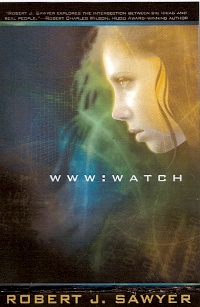Robert Sawyer wrote the novel, Flash Forward, on which the television series is based. He and a couple of other writers are finalists for a Hugo for the pilot episode in the best Dramatic Presentation (Short Form) category, and Sawyer has stayed busy as consultant on each week’s show. He also wrote the script for the 19th episode in the series, “Course Correction,” which will air on May 6.
But Rob hasn’t totally gone Hollywood. The first installment of his WWW trilogy, WWW:WAKE, is also a Hugo finalist this year, and WWW:WATCH, which continues the story, was released this month.
Of course, the biggest trouble with trilogies is that reading the second book doesn’t make much sense unless you have read the first, so, if you haven’t read WWW:WATCH, do it now. (Or, for a teaser, check out my post.) The second problem with trilogies is waiting for the next book, and this one should be worth the wait.
Using her “eyepod,” a computerized device surgically implanted behind her eye, teenage Caitlin Decker, a former Texan transplanted to Canada, has the ability to not only see the world around her, but inside the world wide web. Caitlin, an innocent mathematical genius, finds that sight changes many aspects of her life, and she gets her first real boyfriend.
Caitlin continues to tutor Webmind, an intelligence that has emerged on the Internet, and the rest of her family and the Japanese researcher who perfected the eyepod join her in helping Webmind develop. It isn’t long before Webmind has surpassed them all and shocks itself by discovering that it has not only intelligence but emotions.
Not surprisingly, a United States government agency, WATCH (Web Activity Threat Containment Headquarters) has discovered the possibility that an intelligent entity has surfaced. Since the dawn of the computer age there has been a constant fear that a much-advanced sentience will develop and find the human race expendable. Sawyer refers to several of the motion pictures where a computer mind tries to destroy or take over some or all of humanity. WATCH wants to shut Webmind down before it gets any smarter.
Meanwhile, Hobo, the sign language-adept chimpanzee/bonobo hybrid is going through two crises. He has become increasingly aggressive, and the zoo where he was born wants to take him back and neuter him. Webmind takes an interest and tries to save him from both his problems.
Look for some typical bumbling on the part of WATCH, as the agency tries to strong-arm its policies in Canada and Japan. Before long the feds discover that a teenage girl with an attitude is nothing to mess with, especially when she has a super brain for a buddy.
As usual, Sawyer’s prose is engaging, fast and easy reading. This author writes hard science without making the science hard. His depiction of a high school girl coming of age is spot on, and he excels in making Webmind a human character, all the time reminding us that the Internet intellect is not human.
Readers can always expect that Robert Sawyer will mix great story telling with exercises in ethics and morality. This trilogy is no exception. The final installment, WWW: WONDER, will be released next year.
Mark Graham reviewed books for the Rocky Mountain News from 1977 until the paper closed its doors in February 2009. His “Unreal Worlds” column on science fiction and fantasy appeared regularly in the paper for over two decades. He has reviewed well over 1,000 genre books, including most of Robert Sawyer’s titles. If you see a Rocky Mountain News blurb on a book, it is likely from a review or interview he wrote. Graham also created and taught Unreal Literature, a high school science fiction class, for nearly 30 years in the Jefferson County Colorado public schools.










